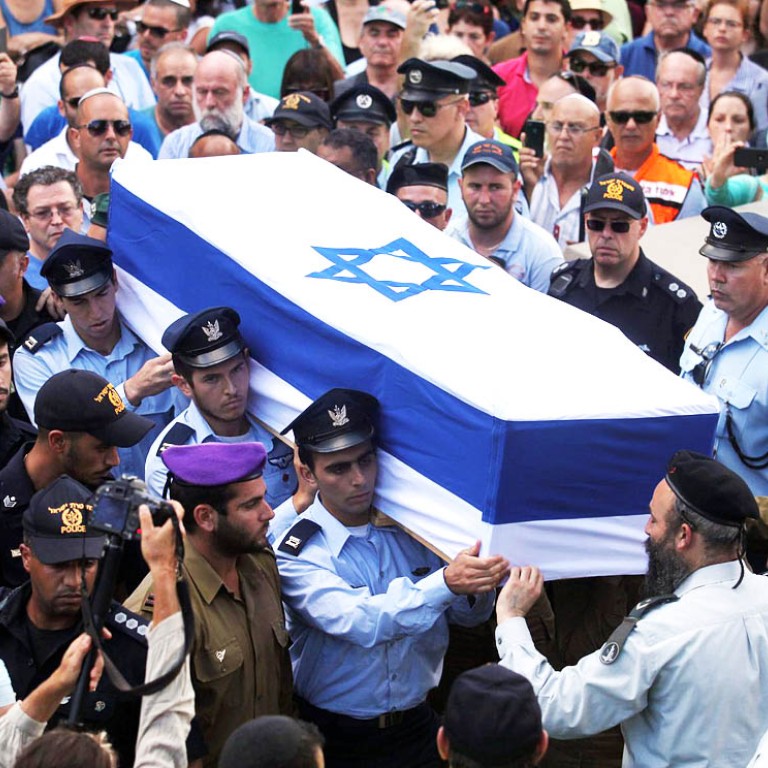
Israelis accept deaths as price that must be paid to confront Hamas
Country has suffered highest military casualty count since 2006, but people accept this as the price that must be paid to confront Hamas
The knock on the door that Yaron Shor had feared for 21 years came late last Monday evening.
"Please tell me he was wounded," Shor implored his visitors.

"The nightmare of every parent in Israel is three officers knocking on your door," a red-eyed Shor said on Sunday as he observed the traditional Jewish mourning period among friends and family at his home in Jerusalem. "It could come in the middle of the day or the dead of night. But you know it's the end of a life."
The grim ritual has been repeated 63 other times across Israel in recent weeks, including in the early hours of Sunday when a soldier thought to have been abducted was confirmed to have been killed.
But despite a casualty count that is high by modern Israeli warfare standards, the toll has provoked little of the second-guessing that has marked past Israeli conflicts. Instead, the public has remained broadly united in viewing the deaths as the price that must be paid for confronting Hamas.
"The government has been very successful at convincing the Israeli public that there's a real threat from the tunnels being dug under Gaza, that the best way to deal with the tunnels is to send in troops, and that there's a cost that comes with that," said Yagil Levy, a professor at the Open University of Israel who studies the military's relationship with Israeli society.
The casualties in this conflict remain overwhelmingly weighted toward Palestinians, with around 1,800 killed. More than half of those dead are civilians, including at least 354 children, according to a UN estimate released on Sunday.
By contrast, the vast majority of Israel's dead are soldiers; three civilians have been killed by rocket fire from Gaza, even though Hamas and its allies have launched more than 3,000 attacks.
Israel's sophisticated Iron Dome anti-missile system has all but neutralised the threat of those rockets. But to destroy the extensive network of tunnels dug under the soft sands of Gaza and southern Israel, the military sent in ground forces this past month.
The result is the highest casualty count for Israeli troops since the 2006 war in southern Lebanon, when 119 soldiers were killed. But unlike in that conflict, which produced a painful reckoning within Israel over whether it had shed its children's blood in vain, there has been little evidence of such anxiety this time.
That's despite the fact that the conflict has now raged for four weeks with no conclusive result and no indication that Hamas is prepared to yield.
Levy said the absence of hand-wringing over the death count was partially the result of a military that had become more self-selective in recent years. Although the Israel Defence Forces remain rooted in the principle of compulsory service by nearly all Israelis, soldiers were increasingly allowed to volunteer themselves for front-line combat duty, Levy said. "They're choosing to be there. The result is less of a backlash when they are killed.
Amotz Asa-El, a senior fellow at the Shalom Hartman Institute, a think tank, said the public's willingness to stomach casualties also had to do with the nature of the threat.
Hamas rockets and tunnels "represent a direct hit at our society," he said. "We are personally targeted - each and every one of us - in our homes."
On Friday, two Israeli soldiers were reported killed, and a third, Lieutenant Hadar Goldin, was thought to have been captured after coming under attack while attempting to destroy a tunnel near the southern Gaza town of Rafah. His fate was uncertain until about 2am on Sunday, when the Israeli military's chief rabbi and Defence Minister Moshe Yaalon - a distant relative of Goldin's - knocked at the family's door.
Thousands of Israelis turned out for his funeral on Sunday afternoon. Troops sporting the purple beret of Goldin's unit looked on as Simcha Goldin urged his son's comrades to "take the Torah with you day and night and be good Jewish fighters".
Barkay Shor was among five troops killed last week when Hamas fighters used a tunnel to infiltrate Israel.
The 21-year-old - the eldest of Yaron Shor's four sons - had volunteered for front-line combat, part of what his father described as a track record of service that included long shifts in the ambulance corps.
"What was so special about Barkay was how eager he was to provide charity to others," said Yaron Shor. "He died protecting the civilians behind him. We are very sorry for his death. But we can't say he died for nothing. He died for the right cause."
